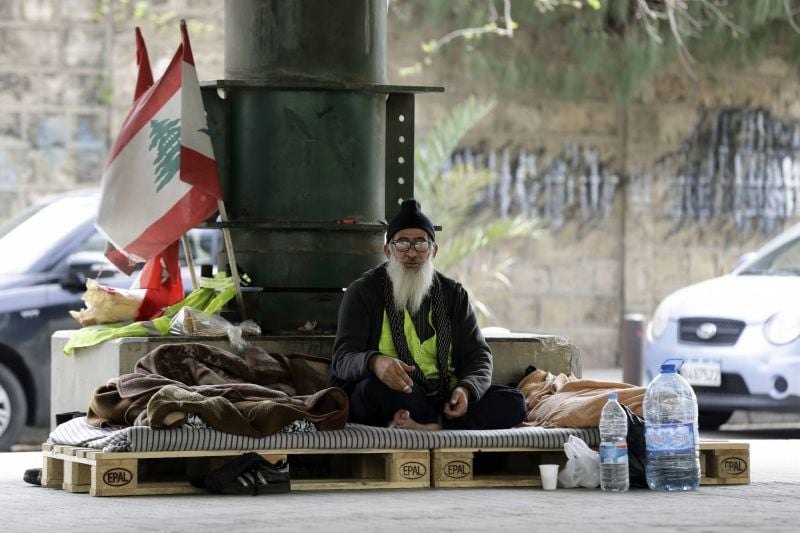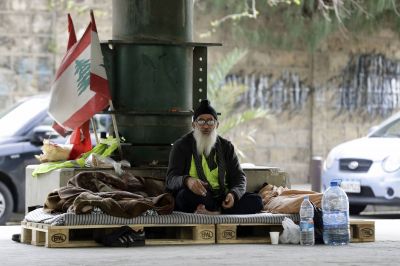
Of the respondents to a survey of 585 elderly people in Lebanon, 82 percent reported having canceled a medical visit in 2020 due to a lack of finances. (Credit: Joseph Eid/AFP)
Even as Lebanon is hardly capable of facing today’s challenges, those of tomorrow have started to emerge. This is what the United Nations Economic and Social Commission for Western Asia (ESCWA) indicated in a study published in mid-June on demographic transition in Lebanon.
Lebanon is projected to surpass all the other Arab countries in terms of its population aging rate. “Lebanon will be the first Arab country to complete its demographic transition. That [is expected] to take place in 2035, when more than 14 percent of the population will be older than 65,” Sara Salman, a population affairs officer at ESCWA, told L’Orient-Le Jour.
By 2050, elderly residents in Lebanon — those aged 65 years and older — are expected to amount to 23 percent of the population. In other words, this segment is expected to more than double from the current 11 percent, a proportion that is already the highest in the Arab World, the report says.
This phenomenon is likely to increase the so-called demographic dependency ratio in Lebanon, or the ratio of the non–working-age population (younger than 20 and older than 60) to the entire population.
As a result, the pressure placed on the productive population will drastically increase, rendering the elderly even more vulnerable.
Is population aging due to the emigration ensuing from the economic hurricane that has wracked Lebanon since 2019?
“Not exactly,” Salman said. According to her, population aging is more an indicator of the country’s [social] development, which is linked to dynamics dating to before the crisis. “One should know that the older age segment begins to grow when there is high life expectancy and low mortality rate,” she said.
Life expectancy at birth in Lebanon increased from less than 68 years in 1980 to 79 years in 2019, according to the World Bank.
At the same time, the annual death rate per 1,000 people plunged from 7.2 in 1980 to 4.4 in 2019.
“These figures are not based on onetime events such as the crisis, but rather on structural factors,” Salman said.
Moreover, the ESCWA figures are part of a regional trend. According to a 2018 report by the UN Population Fund (UNFPA), the share of the population aged 60 and older in the Middle East and North Africa is expected to increase to 15 percent in 2045 — an almost twofold increase from the percentage at the time of the report’s release.
Emigration ‘generates other problems’
However, this does not mean that the crisis has not complicated the situation. Guita Hourani, the director of the Lebanese Emigration Research Center at Notre Dame University, believes Lebanon’s socioeconomic conditions undoubtedly play a role in population aging.
“Lebanon’s situation is pushing young people and families to emigrate. Even those individuals who did not think of leaving the country two years ago are doing so. Eventually, the country is being emptied of young people who got stuck here either due to the COVID-19 crisis or because they lack the means” to leave, she said.
The departures have implications for Lebanon’s economy. “Although emigration may resolve the problem of unemployment, it generates other problems. The economy becomes less dynamic and less competitive, while social security and pension systems are at risk of collapse,” Hourani said.
She said an aging Lebanon risks losing its innovation capacity, as the size of the labor market shrinks. At the same time, a rapidly growing elderly population in a country where social services are almost nonexistent will be the labor market’s responsibility.
“Only a small percentage of the older people segment has access to private health insurance, while some 210,000 elderlies benefit from social security coverage, often through their children,” the report adds.
Furthermore, Lebanon’s private sector lacks a pension system, and many retirees benefit only from a flat end-of-service payment.
‘Age discrimination’
The crisis has rendered even this amount, which in many cases is already small, increasingly scarce as the lira’s value against the US dollar has plummeted.
“Retirees who were lucky enough to cash a retirement pension or termination benefits lost 90 percent of the payments’ worth,” Salman said.
A joint study by the American University of Beirut, the Al Makassed association and the UNFPA indicates that 55 percent of 580 elderly people surveyed said they are hardly able to meet “basic” needs, including 82 percent who had canceled a medical visit in 2020 due to a lack of finances. Additionally, 65 percent of them reported feeling rejected due to “age discrimination.”
The ESCWA report recommends that to adapt to the increasingly aging population, the Social Affairs Ministry should develop a “national senior strategy.”
No funding sources currently exist for a project with such ambitious goals. The program would involve setting up universal health coverage based on civic and intergenerational solidarity, as well as an “adequate” pension system and a better integration of the elderly into society.
“Today, older adults are not well integrated in the labor market. Those who continue to work often do so under precarious conditions, because they are not covered under Lebanon’s Labor Law,” Salman, the ESCWA researcher, said. She added that elderly people’s access to services such as public transport and healthcare is limited.
If the project were to be realized, everyone would have access to these services. “Instead of perceiving this age segment as unequivocally in need, we must recognize their role as active and integrated individuals who have much to contribute to society,” the report reads.
“For instance, integrating older people into the labor market as consultants would allow us to benefit from their expertise,” Salman said.
“Also, we need to remember that today’s adults will become seniors in 2050. Hence, it is in everyone’s interest to take action promptly,” she added.
This article was originally published in French in L’Orient-Le Jour. Translation by Joelle El Khoury.
